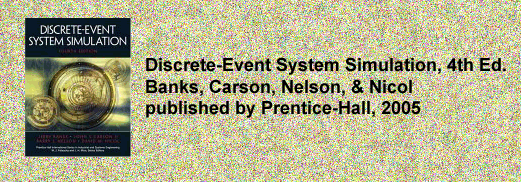CP463 SIMULATION, WINTER 2007, WLU
Course Description
The course provides an introduction to Discrete Event Simulation.
Prerequisites
MA240 (or equivalent) and permission of the Depatment
Instructor
Dr. Ilias S. Kotsireas, Office 2076A,
Office Hours 24/7 and by appointment, Phone 884-0710 ext. 2218
E-Mail: ikotsire@@wlu.ca
Course Textbook
Textbook Support Web Site A link to the book support web page is available at: http://www.bcnn.org/
Course Website A link to the course web page is available at: http://sauron.wlu.ca/kotsireas/teaching.html
Notes/Overheads
- Statistical Models
- RandomNumberGeneration
Lecture Topics (corresponding to the 12 weeks schedule)
- Introduction
- Systems, System Environment
- Components of a System
- Discrete and Continuous Systems
- Models of a System, Types of Models
- Applications of Simulation
CH1
- Simulation Examples
- Simulation of Queueing Systems
- Simulation of Inventory Systems
- Random Normal Numbers
- Lead-Time Demand
CH2
- General Principles of Simulation
- Concepts: System, Model, System state, Entity, Attributes, List, Event, Event Notice, Event List, Activity, Delay, Clock
- The Event Scheduling/Time Advance Algorithm, Future Event List (FEL),
- Manual Event Scheduling, Flow charts for the execution of arrival/departure events
- List Processing, Properties, Operations, Arrays, Dynamic Allocation, Linked Lists
CH3
- Introduction to GPSS, Elements of Probability Theory
- Useful Statistical Models CH5
- Queuing Theory
- Queue Behavior, Queue Discipline
- Service Times
- Queuing Notation, A/B/c/N/K
- Measures of Performance, long-run average time spent in system/queue per customer, server utilization
- The Conservation Equation
CH6
- Random Number Generators
- Properties of Random Numbers
- Pseudo-random Numbers
- Linear Congruential Method
- Tests for Random Numbers, Frequency, Autocorrelation
CH7
- Random Variate Generation
- Inverse-Transform Technique
- Acceptance-Rejection Technique
CH8
- Input Modeling CH9
- Verification and Validation of Simulation Models CH10
- Simulation of Computer Systems, Simulation of Computer Networks, CH14, CH15
- Research Projects Presentations
Class Schedule
- Tue 2:30 - 3:50 Room BA431
- Thu 2:30 - 3:50 Room BA431
Winter Semester Timetable
| Tue | Thu |
| 2:30-3:50 | 2:30-3:50 |
| BA431 | BA431 |
______________|_____________|_____________|_
| | |
Week 1: | --- | Jan 04 |
Week 2: | Jan 09 | Jan 11 |
Week 3: | Jan 16 | Jan 18 |
Week 4: | Jan 23 | Jan 25 |
Week 5: | Jan 30 | Feb 01 |
Week 6: | Feb 06 | Feb 08 |
Week 7: | Feb 13 | Feb 15 |
______________|_____________|_____________|_
Reading Week Feb 19 - Feb 23 N o C o u r s e s
_____________________________________________
| | |
Week 8: | Feb 27 | Mar 01 |
Week 9: | Mar 06 | Mar 08 |
Week 10: | Mar 13 | Mar 15 |
Week 11: | Mar 20 | Mar 22 |
Week 12: | Mar 27 | Mar 29 |
| Apr 03 | --- |
______________|_____________|_____________|__
| | |
Course Requirements/Student Evaluation
- Assignment 1: 10% due date: Tuesday, January 30, in class or by e-mail.
- Assignment 2: 10% due date: Tuesday, March 13, in class or by e-mail.
- Midterm: 40%, Tuesday, February 27, in class.
- Term Project: 30% due date: Tuesday, April 3.
All students will be required to prepare a Term Project, details in class.
Students may form teams (of no more than 3 students each) to work on the Term Project collaboratively.
- Research Projects Presentations: 10%, Week 12 of courses.
All students will be required to study and understand
a research article relevant to Simulation research.
Half-hour presentations (20-min talk + questions/answers)
will be scheduled for the last week of courses.
Students will work on this project individually.
New Course Drop Dates 2006/2007:
September 8: final day to cancel Fall term and Fall/Winter session registration with no tuition charge (cancellation fee applies)
September 22: final day to drop 12-week and fall/winter session course(s) or withdraw at 10% tuition charge
November 6: final day to drop course(s) or withdraw from 12-week course(s) without failure and for tuition adjustment
January 2: final day to cancel Winter term registration with no tuition charge (cancellation fee applies)
January 16: final day to drop 12-week winter term course(s) or withdraw at 10% tuition charge
March 6: final day to drop course(s) or withdraw from two-term or 12-week Winter term course(s) without failure and for tuition adjustment
Examination Deferrals:
The Academic Date section of the Calendar (Printed and Web Site Versions) clearly states the examination date period for each semester. Students must note that they are required to reserve this time in their personal calendars for the examinations. The examination period for this course is APRIL 9-27, 2007. Students who are considering registering to write MCAT, LSAT or GMAT or a similar examination, should select a time for those examinations that occurs outside the University examination period. For additional information that describes the special circumstances for examination deferment, consult the University calendar.
Student Awareness of the Accessible Learning Centre:
Students with disabilities or special needs, are advised to contact Laurier.s Accessible Learning Centre for information regarding its services and resources. Students are encouraged to review the Calendar for information regarding all services available on campus.
Academic and Research Misconduct:
Academic misconduct is an act by a student, or by students working on a team project, which may result in a false evaluation of the student(s), or which represents a deliberate attempt to unfairly gain an academic advantage. Academic misconduct includes: please refer to page 111 in the 2006/2007 Undergraduate Calendar.
Plagiarism Detection Software:
Wilfrid Laurier University uses software that can check for plagiarism. Students may be required to submit their written work in electronic form and have it checked for plagiarism.
STEP: Science & Technology Endowment Program:
The Program was established in 1995, with the opening of the New Science Building. Students in the Departments of Biology, Chemistry, Physics and Computer Science and Psychology approved a voluntary student contribution program designed to enhance educational experience and opportunities of undergraduate students in these areas. GET INVOLVED!
